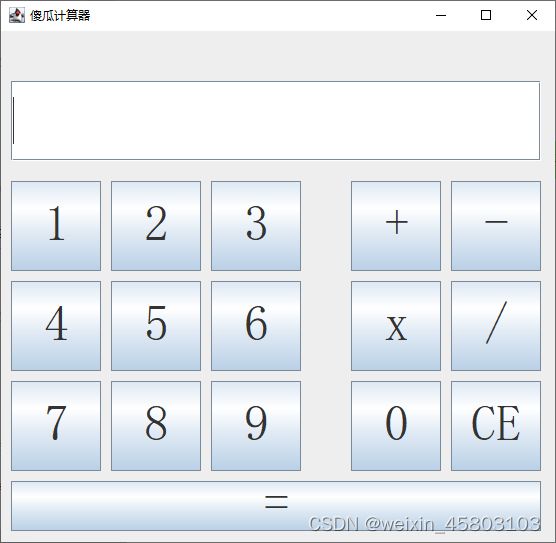JAVA制作的简易计算器——傻瓜计算器
用JAVA编写的傻瓜计算器
作用:
1.可以实现加法、减法、乘法、除法简单运算且是单一运算,不可混合使用。
2.CE为清除键
3.没有小数点O(∩_∩)O
思路:
创建JFrame窗口,设置标题,创建JButton,创建文本框JTextField用作显示。
先定义各种按钮类型,用作成员。定义窗口方法对窗口进行设置。定义按钮事件方法,每个按钮的
每次点下在文本框都会进行打印。以运算符为界限对字符串进行分割,并把分割后的字符串放入新
建的数组当中。对字符串数组内容访问转换为整数类型,进行运算。运算的结果为double类型的并
把结果打印到文本框中。
成品:
代码实现:
package test1;
import javax.print.attribute.standard.JobMessageFromOperator;
import javax.swing.*;
import java.awt.*;
import java.awt.event.ActionEvent;
import java.awt.event.ActionListener;
import java.util.ArrayList;
public class Window extends JFrame{
private JButton ADD=new JButton("+");
private JButton SUB=new JButton("-");
private JButton SUM=new JButton("x");
private JButton DIV=new JButton("/");
private JButton l=new JButton("0");
private JButton y=new JButton("1");
private JButton e=new JButton("2");
private JButton s=new JButton("3");
private JButton s4=new JButton("4");
private JButton w=new JButton("5");
private JButton l6=new JButton("6");
private JButton q=new JButton("7");
private JButton b=new JButton("8");
private JButton j=new JButton("9");
private JButton dengyu=new JButton("=");
private JButton qingchu=new JButton("CE");
private JTextField jt=new JTextField();
private String shuju;
public Window(){
window();
addJb();
addjt();
add();
this.setVisible(true);
}
public void window(){
//窗体大小
this.setSize(570,550);
//窗体标题
this.setTitle("傻瓜计算器");
//解除窗体的默认设置
this.setLayout(null);
//窗体关闭程序停止
this.setDefaultCloseOperation(3);
//窗体位于屏幕中央
this.setLocationRelativeTo(null);
}
//按钮大小位置设置
public void addJb(){
ADD.setBounds(350,150,90,90);
ADD.setFont(new Font("宋体", Font.PLAIN, 50));
this.add(ADD);
SUB.setBounds(450,150,90,90);
SUB.setFont(new Font("宋体", Font.PLAIN, 50));
this.add(SUB);
SUM.setBounds(350,250,90,90);
SUM.setFont(new Font("宋体", Font.PLAIN, 50));
this.add(SUM);
DIV.setBounds(450,250,90,90);
DIV.setFont(new Font("宋体", Font.PLAIN, 50));
this.add(DIV);
y.setBounds(10,150,90,90);
y.setFont(new Font("宋体", Font.PLAIN, 50));
this.add(y);
e.setBounds(110,150,90,90);
e.setFont(new Font("宋体", Font.PLAIN, 50));
this.add(e);
s.setBounds(210,150,90,90);
s.setFont(new Font("宋体", Font.PLAIN, 50));
this.add(s);
s4.setBounds(10,250,90,90);
s4.setFont(new Font("宋体", Font.PLAIN, 50));
this.add(s4);
w.setBounds(110,250,90,90);
w.setFont(new Font("宋体", Font.PLAIN, 50));
this.add(w);
l6.setBounds(210,250,90,90);
l6.setFont(new Font("宋体", Font.PLAIN, 50));
this.add(l6);
q.setBounds(10,350,90,90);
q.setFont(new Font("宋体", Font.PLAIN, 50));
this.add(q);
b.setBounds(110,350,90,90);
b.setFont(new Font("宋体", Font.PLAIN, 50));
this.add(b);
j.setBounds(210,350,90,90);
j.setFont(new Font("宋体", Font.PLAIN, 50));
this.add(j);
dengyu.setBounds(10,450,530,50);
dengyu.setFont(new Font("宋体", Font.PLAIN, 50));
this.add(dengyu);
qingchu.setBounds(450,350,90,90);
qingchu.setFont(new Font("宋体", Font.PLAIN, 50));
this.add(qingchu);
l.setBounds(350,350,90,90);
l.setFont(new Font("宋体", Font.PLAIN, 50));
this.add(l);
}
//文本框设置
public void addjt(){
jt.setBounds(10,50,530,80);
jt.setFont(new Font("宋体", Font.PLAIN, 40));
this.add(jt);
}
//添加按钮事件
public void add(){
y.addActionListener(new ActionListener() {
@Override
public void actionPerformed(ActionEvent e) {
number("1");
}
});
e.addActionListener(new ActionListener() {
@Override
public void actionPerformed(ActionEvent e) {
number("2");
}
});
qingchu.addActionListener(new ActionListener() {
@Override
public void actionPerformed(ActionEvent e) {
// jt.setText(jt.getText().substring(0, jt.getText().length() - 1));
jt.setText("");
}
});
s.addActionListener(new ActionListener() {
@Override
public void actionPerformed(ActionEvent e) {
number("3");
}
});
s4.addActionListener(new ActionListener() {
@Override
public void actionPerformed(ActionEvent e) {
number("4");
}
});
w.addActionListener(new ActionListener() {
@Override
public void actionPerformed(ActionEvent e) {
number("5");
}
});
l6.addActionListener(new ActionListener() {
@Override
public void actionPerformed(ActionEvent e) {
number("6");
}
});
q.addActionListener(new ActionListener() {
@Override
public void actionPerformed(ActionEvent e) {
number("7");
}
});
b.addActionListener(new ActionListener() {
@Override
public void actionPerformed(ActionEvent e) {
number("8");
}
});
j.addActionListener(new ActionListener() {
@Override
public void actionPerformed(ActionEvent e) {
number("9");
}
});
l.addActionListener(new ActionListener() {
@Override
public void actionPerformed(ActionEvent e) {
number("0");
}
});
ADD.addActionListener(new ActionListener() {
@Override
public void actionPerformed(ActionEvent e) {
number("+");
}
});
SUB.addActionListener(new ActionListener() {
@Override
public void actionPerformed(ActionEvent e) {
number("-");
}
});
SUM.addActionListener(new ActionListener() {
@Override
public void actionPerformed(ActionEvent e) {
number("x");
}
});
DIV.addActionListener(new ActionListener() {
@Override
public void actionPerformed(ActionEvent e) {
number("/");
}
});
dengyu.addActionListener(new ActionListener() {
@Override
public void actionPerformed(ActionEvent e) {
deng();
}
});
}
//按钮输出数字方法
public void number(String a){
jt.setText(jt.getText() + a);
}
//等号运算方法
public void deng(){
//读取文本框字符串
String str=jt.getText();
//字符串拆成字符
char [] ch=str.toCharArray();
String[] ing=new String[ch.length];
int[] a=new int[ing.length];
double sum=0;
for(int i=0;iPS:
初来乍到的小白一枚,里边运用到了窗口、组件、监视器。初学者可以简单参考一下。顺便加深一下知识点的印象。学习就应该循序渐进,一步一个脚印来。里边多少会有些问题希望在你们手里可以得到改进,同时你也可以学到新的知识。O(∩_∩)O
